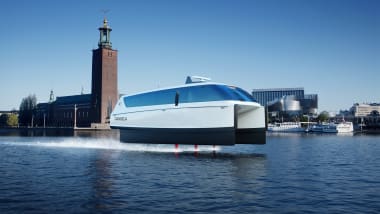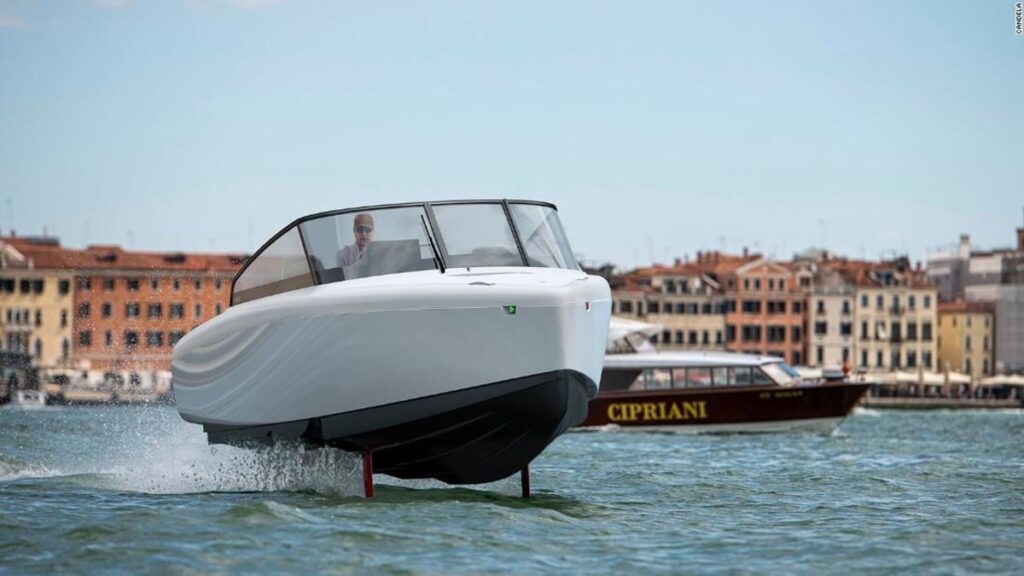Italy: Company claims its boats can save Venice

Venice: That Venice is in peril is indisputable. That it is ultimately saveable is up for discussion. Now, one company thinks they can make a difference to the floating, sinking city — with “flying” boats.
Swedish company Candela thinks that its electric boats can help fight “moto ondoso” — the damaging phenomenon of waves bashing against the buildings and sidewalks from the wakes of boats being driven around the city.
Moto ondoso has been tipped by UNESCO as a “macro emergency” facing the fragile lagoon city. The organization says there is a need to “drastically reduce the effects produced by motor boats.”
Candela’s boats aim to do that. The Candela C-8 and P-8 Voyager are the first no-wake, high-speed foiling daycruisers. And while the C-8 is a classic boat, the P-8 Voyager has been designed to be able to take passengers — as a taxi or a shuttle boat, sparking thoughts that it could be adopted on a larger level around the city.

Designed by aviation and drone engineers, the boats produce a wake of just 5 centimeters (2 inches) when “flying” at 30 knots — roughly the same amount as a hand-paddled gondola, and unlikely to bash the city’s foundations with waves.
Meanwhile, the larger 30-seater P-12, which was announced in June 2022, promises to be the first “flying” ferry — with a range of 60 nautical miles and speeds up to 60 kph (37 mph), which the manufacturers say could beat rush hour traffic on routes with an alternative on wheels.
The 2022 launches follow the launch of Candela’s first boat, the pilot C-7, which debuted in 2019. Unlike the other boats, it lacks an enclosed cabin, making it more of a pleasure boat for summer.
Electric cars may have been popular for some time, but electric boats have had a harder ride. The water drag on the hull of a boat, combined with the weight of the battery needed to power it, is a double blow for boats, meaning that most have to compromise on either speed or distance.
A 100kWh capacity battery pack in a regular vessel can only manage 30 nautical miles at 20 knots before it runs out, according to Candela. But raising the hull out of the water solves the problem of the drag. These boats have an efficiency of 400%, and can cruise for 150 minutes before needing to recharge, say the company.
Candela’s “flying” boats were the brainchild of founder Gustav Hasselskog, who noticed that his quick ice cream runs while on vacation in the Swedish lakes was costing around 10 times the price of his family’s ice creams in gas.
He calculated that conventional boats use around 15 times more energy than a car, at a steady rate of 20 knots — which made them problematic to power via battery. Instead, he thought about raising the boats out of the water, on hydrofoils, to make them “fly,” and employed aviation and drone engineers to make them a reality.
“Flying in absolute silence, without any slamming and basically for free — it’s just an amazing experience. Once you’ve tried Candela, it will be hard to go back to traditional powerboats”, said Hasselskog, in a statement about the C-8.
“Venice, which is dependent on motorboats but also suffers from their impact, is the perfect place to show how Candela’s craft can contribute to a better world, while offering new levels of performance.”
The boat begins sailing like any other, but — just like a plane — as it builds up speed, it begins to rise. The foils can also retract, meaning that the boats aren’t at risk of marine growth, which could otherwise fur them up.
However, that need for speed to raise the foils means saving Venice won’t be as easy as switching to electric, said Dr Pierpaolo Campostrini, managing director of CORILA, which studies the lagoon system in Venice.
“Boats with that kind of hull don’t produce the moto ondoso when using their foils, but the foils are only activated above a certain speed, which at the moment seems high for the lagoon context,” he told CNN.
“It is certainly not a concept suitable for a vaporetto [waterbus] in the Grand Canal or a cargo boat.”
However, he thought the boats could have potential outside the city center, such as on the way to the airport, further north in the lagoon, or connecting Venice to islands such as Burano and Pellestrina.
However, he warned that maneuvering the boats at high speed around slower traffic could be difficult, and said that a rethink of the city’s transport is in order before decisions are taken.
“It would be interesting to do some experiments [with Candela], but before this possibility is introduced on a large scale, all lagoon water mobility should be rethought,” he said.
“It’s crucial firstly to accelerate the transition to electric propulsion of all boats in the lagoon as far as possible, secondly to enforce compliance of speed limits through existing technologies that can recognize the type of boat, and thirdly, possibly, to adapt the speed limit to the type of boat.”





